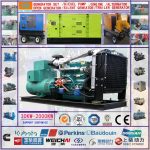Diesel Generators for Voltage Support A Comprehensive Guide to Their Role and Function in Power Systems

Introduction:
In modern society, electricity plays a crucial role in almost every aspect of our daily lives. From lighting our homes to powering industries, the demand for electricity continues to grow. However, ensuring a stable and reliable supply of electricity can be challenging, especially when faced with fluctuations in voltage levels. Voltage support is essential to maintain the stability of the power grid and prevent disruptions in power supply. Diesel generators are a popular choice for providing voltage support in power systems due to their reliability and efficiency. In this article, we will explore the role and function of diesel generators in voltage support, their benefits and limitations, as well as best practices for their deployment in power systems.
Understanding Voltage Support:
Voltage support is a critical aspect of power system operation that involves maintaining the voltage levels within acceptable limits to ensure the stability of the grid. Voltage fluctuations can lead to equipment damage, power outages, and other operational issues. Voltage support is particularly important during times of high demand or when there are sudden changes in load, such as during peak hours or in the event of a fault in the system.
Diesel Generators for Voltage Support:
Diesel generators are commonly used for voltage support in power systems due to their robust design, reliability, and ability to provide power quickly when needed. Diesel generators consist of an engine that runs on diesel fuel and a generator that converts mechanical energy into electrical energy. These generators are available in various sizes and capacities to suit different power system requirements.
Benefits of Diesel Generators for Voltage Support:
There are several benefits to using diesel generators for voltage support in power systems. One of the key advantages is their ability to provide quick and reliable power during emergencies or when there is a sudden increase in demand. Diesel generators can be started and connected to the grid within minutes, making them ideal for providing backup power during outages.
300kw diesel generator for remote humanitarian projects of diesel generators is their fuel efficiency and cost-effectiveness. Diesel fuel is readily available and relatively affordable compared to other fuel sources, making diesel generators a cost-effective option for voltage support. Additionally, diesel generators have a long lifespan and require minimal maintenance, reducing overall operational costs in the long run.
Moreover, diesel generators are known for their durability and reliability. They are designed to operate continuously for extended periods without significant performance degradation, making them a dependable source of power for voltage support. Diesel generators can also be easily integrated into existing power systems, providing a seamless solution for maintaining voltage stability.
Limitations of Diesel Generators for Voltage Support:
While diesel generators offer many benefits for voltage support, there are also some limitations to consider. One of the main drawbacks of diesel generators is their environmental impact. Diesel fuel combustion produces emissions such as nitrogen oxides and particulate matter, which can contribute to air pollution and climate change. To mitigate these environmental impacts, it is essential to use diesel generators in compliance with emission regulations and to consider alternative fuel options.
Another limitation of diesel generators is their noise levels. Diesel generators can be noisy during operation, which may be a concern in residential areas or other noise-sensitive environments. Proper soundproofing and acoustic insulation measures can help reduce noise levels from diesel generators and minimize their impact on surrounding areas.
Additionally, diesel generators require regular maintenance and servicing to ensure optimal performance. Routine inspections, oil changes, filter replacements, and other maintenance tasks are necessary to prevent breakdowns and prolong the lifespan of diesel generators. Adequate fuel storage and handling practices are also essential to maintain the reliability of diesel generators for voltage support.
Best Practices for Deploying Diesel Generators for Voltage Support:
To maximize the benefits of diesel generators for voltage support and mitigate their limitations, it is important to follow best practices for their deployment in power systems. Some key considerations include:
1. Proper Sizing: Selecting the right size and capacity of diesel generators based on the power system requirements is essential to ensure adequate voltage support. Oversized or undersized generators can lead to inefficiencies and increased operating costs.
2. Regular Maintenance: Implementing a proactive maintenance schedule for diesel generators is critical to prevent unexpected failures and ensure reliable operation. Regular inspections, servicing, and testing should be conducted to identify and address any issues promptly.

3. Fuel Management: Proper fuel storage, handling, and monitoring practices are essential to maintain the availability and quality of diesel fuel for generators. Regular fuel testing and filtration can help prevent fuel degradation and ensure optimal generator performance.
4. Environmental Compliance: Adhering to emission regulations and implementing emission control measures are essential to minimize the environmental impact of diesel generators. Using low-sulfur diesel fuel, installing exhaust treatment systems, and optimizing generator operation can help reduce emissions.
5. Noise Mitigation: Implementing soundproofing measures, such as acoustic enclosures and barriers, can help reduce noise levels from diesel generators and mitigate their impact on surrounding areas. Locating generators away from noise-sensitive areas can also help minimize noise disturbances.
Conclusion:
Diesel generators play a crucial role in providing voltage support in power systems, ensuring the stability and reliability of the grid. With their quick response time, cost-effectiveness, and reliability, diesel generators are a popular choice for backup power generation during emergencies and high-demand situations. While diesel generators offer many benefits for voltage support, it is important to consider their limitations and follow best practices for their deployment to maximize their efficiency and minimize their environmental impact. By understanding the role and function of diesel generators in voltage support, power system operators can effectively utilize these generators to maintain voltage stability and meet the growing demand for electricity in modern society.
